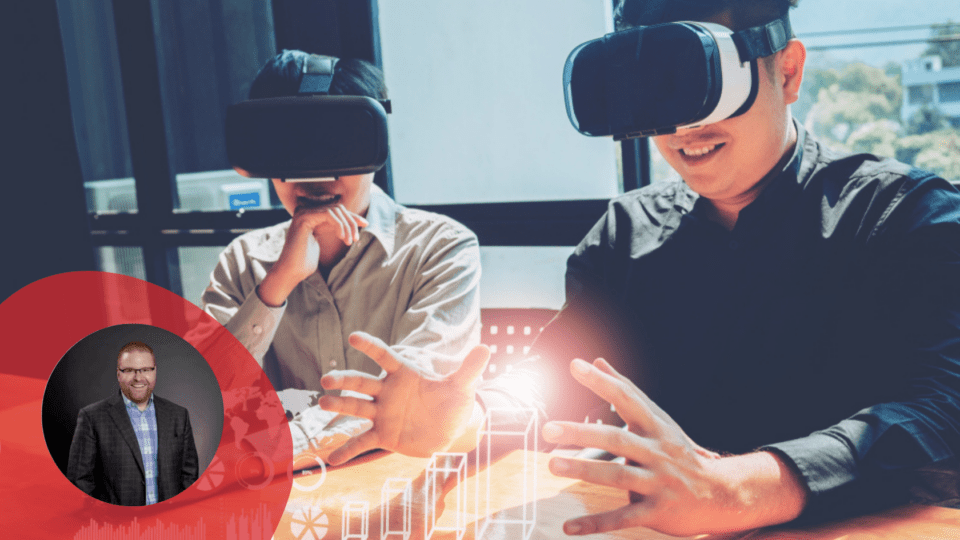In today’s tight labor market, training has become more critical than ever. Nowhere is that truer than in the retail space, where it is particularly important to train your employees quickly and engage them effectively to create long-term organizational loyalty. By adding augmented reality (AR) and virtual reality (VR) to your training program, organizations can reach their training goals more quickly and efficiently.
AR and VR training can be used for employees throughout the organization because it is flexible enough to teach job-specific hard skills as well as the soft skills necessary to navigate retail environments successfully.
To illustrate how AR and VR can be used to train employees thoroughly and expeditiously, here are five scenarios where AR and VR training can enhance your employees’ training experiences.
1. Retail onboarding.
In a fast-paced retail environment, managers must get new employees up to speed on their duties and on the sales floor as soon as possible. While time is of the essence, it is also important to be thorough, because employees will likely be interacting with customers shortly after their training ends.
VR training offers a safe environment to provide comprehensive training quickly and allows employees to make mistakes that don’t threaten the organization’s bottom line. For example, in a VR environment, employees can take virtual tours of the sales floor to learn where products are located and how they fit into the brand’s overall message before they step onto the sales floor. Equally important is that VR gives organizations the flexibility to train employees remotely, which minimizes the need to coordinate schedules and reduces the stress that sometimes accompanies in-person training.
2. Customer service training.
One of the most challenging aspects of retail training is communicating the best way for employees to interact with customers.These touch points can have significant effects on how customers view a brand and whether they remain loyal to the brand long-term.
For example, an employee can put on a headset and practice calming an angry customer by walking through a role-playing conversation. In the process, they can learn what the store policies are and how to word their responses in ways that are respectful to the customer while also making them happy.
This type of VR retail training is called experiential learning, which is considered by many to be the most efficient learning method. By allowing your employees to experience a number of different scenarios, they will be better able to react appropriately when confronted with the same situations involving actual customers.
3. Product knowledge training.
Before retail employees can effectively sell products, they must first have a thorough understanding of what the products do and how they solve customers’ potential pain points.With AR training, employees can learn about products without having the products in front of them.
Using a phone, tablet or headset, they can see existing or new products before they even arrive, allowing them to familiarize themselves with product components and gain necessary knowledge.Employees can pull up digital re-creations of products in AR and use their device to look at all the components, learn about how they work and see videos of them in action. AR technology already provides insights for customers into what they want or need; why shouldn’t employees take advantage of the same technology?
Since AR training can often be accessed on a smartphone instead of investing in real-life products, it can be even more cost-effective than more traditional product knowledge training.
4. Sales training.
In the same vein as customer service training, sales training using VR technology allows employees the ability to test out sales pitches in stress-free role-playing scenarios.
Employees can effectively demonstrate their familiarity with products and services, practice empathizing with customers and understanding their needs, and demonstrate effective conflict resolution — all without the high-pressure situation of creating a real-life sale.
With VR training, employees can put on headsets and walk through a sales interaction through role playing. They can practice objection handling and even choosing the right product recommendation for their virtual customer. These soft skills are critical to sales success and can enhance the organization’s bottom line.
VR training allows employees to find which sales strategy best fits their personality and skills in a risk-free environment. Practicing these skills before they encounter real customers will make them more effective salespeople once they actually reach the sales floor.
5. Safety training.
Even in the best retail situations, there will be times when training must cover topics like employee and customer safety.While these situations are generally the exception rather than the rule, it is a vital part of training that is often overlooked.
Whether they’re dealing with natural disasters, fires, violent customers, shoplifters or armed robberies, VR training can help teach employees the organization’s protocols for dealing with any of these situations in ways that will protect themselves and others.
By putting them in simulated emergencies where there is no actual risk, it will help solidify employees’ reactions and make them more adept at handling such instances should they come up in their work environment.
Finding the Right Partner
As the interest in AR/VR training grows, retail organizations should take advantage of this innovative training that is not only effective but engaging and experiential as well.While AR/VR training can be a valuable addition to any retail training program, it’s important to understand that you don’t have to create these programs on your own.
There are partners that can help you design and execute the right strategy, tailored specifically to the needs of your retail business.Once you’ve discovered the power of AR/VR training for your retail employees, you’ll wonder how you ever did training without it.
Nick Day is VP of Sales and Client Solutions at Roundtable Learning, a Chagrin Falls, Ohio-based immersive training organization.




